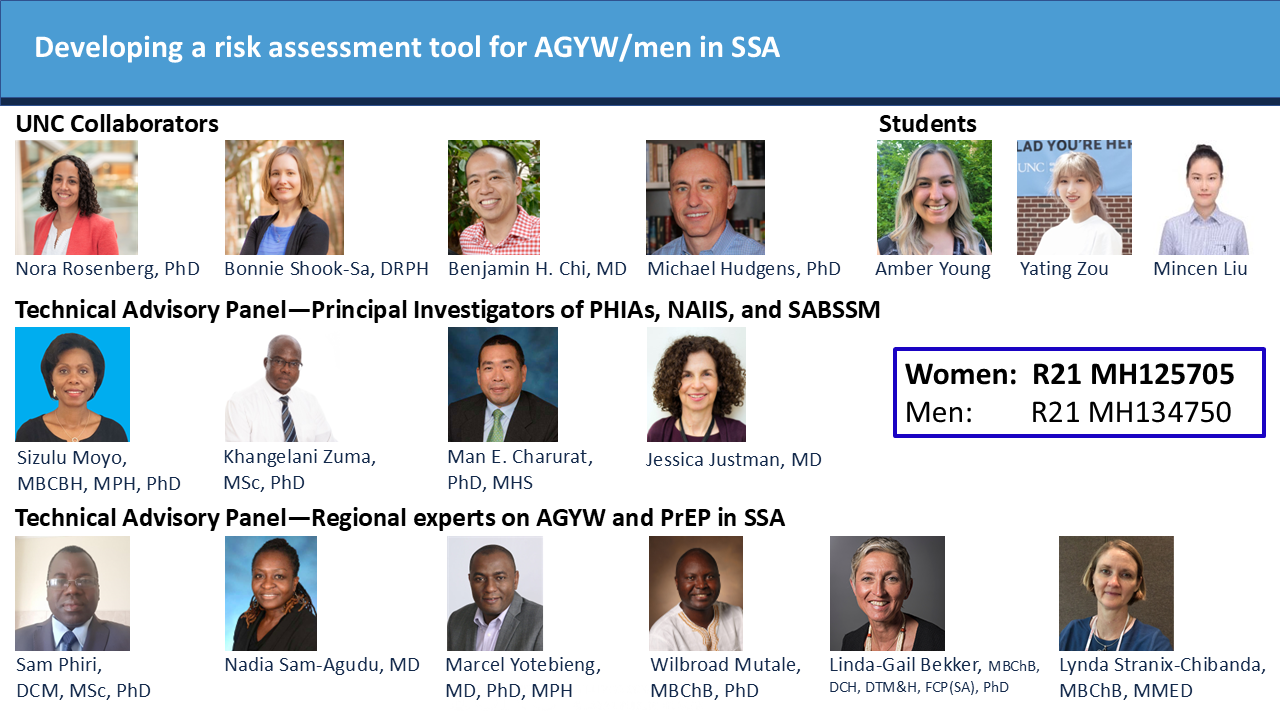Machine Learning and Digital Health Interventions
Risk Assessment Tools
Project Dates:
07/2023 - 06/2025
Role:
Principal Investigator
Funder:
NIMH
R21MH134750
Project Dates:
04/2021 - 03/2024
Role:
Principal Investigator
Funder:
NIMH
R21MH125705
Developing a risk assessment tool to identify men at highest risk of HIV acquisition in sub-Saharan Africa: a regionally representative analysis using machine learning methods
Men in Sub-Saharan Africa are at high risk for HIV acquisition. Although there are several biomedical HIV prevention strategies available for reducing HIV acquisition, it is not feasible to provide biomedical HIV prevention to all of the men in the region. Our team developed a risk assessment tool to identify men who would be most likely to benefit from biomedical HIV prevention.
Developing a risk assessment tool to identify HIV-uninfected adolescent girls and young women at highest risk for HIV infection: a key step for targeted biomedical HIV prevention
Young women 15-24 years old are at high risk for HIV acquisition in Sub-Saharan Africa. Tenofovir-based oral pre-exposure prophylaxis (PrEP) is a promising intervention for reducing HIV acquisition in this group, but it is not feasible, economical, or necessary to provide PrEP to all 100 million young women in the region. This research developed a tool to identify subsets of young women who would benefit most from PrEP.
-
Rosenberg NE, et al. An HIV-1 risk assessment tool for women aged 15-49 in African countries: A pooled analysis across 15 nationally representative surveys. Clin Infect Dis. 2024. [PubMed]
Rosenberg NE, et al. Adult HIV-1 incidence across 15 high-burden countries in sub-Saharan Africa from 2015 to 2019: a pooled analysis of nationally representative data. Lancet HIV. 2023. [Full Text]
Graybill LA, et al. Characterizing populations prioritized for PrEP in 19 African countries: A review of national guidance; Journal Title: J Int AIDS Soc. 2025. [Full Text]
REMAIN: Retain, Maintain, Sustain
Project Dates:
03/2023 - 02/2028
Role:
Co-Investigator
multiple PIs:
Pamina Gorbach, Lisa Hightow-Weidman, Sean Young
Funder:
NIAID
UG3AI176592
Exploring, Predicting, and Intervening on Long-Term Viral suppression Electronically (EPI-LoVE)
Remain is enrolling a digital cohort of people living with HIV in the US who are not virally suppressed, as well as individuals who report prior gaps in HIV care engagement or lack of sustained viral suppression. The cohort will be followed over time to prospectively investigate trajectories of HIV care engagement and viral suppression, as well as the temporal antecedents and multilevel factors that drive changes in care engagement, treatment adherence, and viral suppression.





